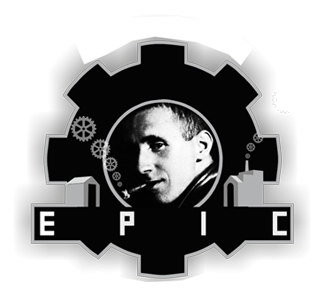
What form is Brechtian theatre likely to take in the present day? The extraordinary project by the Debris Company entitled Epic takes inspiration from Bertolt Brecht’s premises in order to set out for a journey rather unusual with respect to their prior production, into the unexplored theatrical terrain where contemporary dance blends with a modern understanding of opera, kitsch entertainment, and new technologies in a merciless mix with movies of the 1920s – 1930s.
They proceed by exploring and testing new theatre techniques, technologies and their dramaturgy is becoming increasingly more specific. Again, similarly to the production of Mono, they are interested in contemporary individualised "capitalist" society.
Epic is both an allusion to Brecht and a Brechtian comment on Brecht which goes beyond him. Similarly to Brecht’s work, it does not lack humour and sharp criticism of the society and nameless or renamed individuals. The songs' music and texts juggle with the Brechtian legacy, relatively little known in Slovakia. From the point of view of the physical – it again blends contemporary and classical movement and also quotes silent movie pantomime. Opera arias interspersed with musical quotations of The Doors band and Brecht’s court composer Kurt Weill, Irish proletarian folklore or other references.
Implicitly, the Debris Company ask themselves the cardinal question – what is today’s theatre like and what is actually its social function? Is it still able to convey social criticism at all? Can it serve as the voice of the "oppressed" majority against the elitarian minority? These are the questions answered by the authorial statement of Peter Lomnický expressed in both his text and typically Brechtian songs.
Social inequality apparently exists and is becoming increasingly greater and more pronounced than it may seem at first sight. What does it involve to be a member of the working class, although we do not call it so anymore? What does it involve to be an “exploiter”, even though we do not use such a term nowadays? Nevertheless, inequality and social injustice are the same as in the time of Bertolt Brecht, only their form has changed. And it may be even more mischievous, as it seems to be less striking – that is if what interests us is its reflection in the European perspective.
And we do not only have in mind the utopian dream of a transformed society, in which Brecht still believed in, at least partially. Today it is not possible anymore.
The Debris Company does not comment on the fashionable topic of the crisis, it does not intend to add to the bulk of contemporary theatre which must also urgently address the worsening economic situation, so profusely covered by the mass media. The whole situation has become so labyrinthine that it is absolutely uncertain if anyone at all can offer at least a partially satisfying answer to the intricate ways economic policy is implemented nowadays. The attitude of the Debris Company is rather a comment on what Tony Judt calls moral degeneration – abundance always leads to discrimination of a majority in favour of a minority, and inequality brings a whole range of pathological phenomena. The way society patterns, in terms of social structure and organisation, work and the way they influence people and their private relationships, and whether it is possible to cross the river, or to create another illusion of a man floundering in this environment – all that and more is dealt with in the new production of the Debris Company Epic.
Epic je parafráza brechtovského divadla v 21. storočí. Debris Company skúma vo svojej novej produkcii krízu a kapitalizmus. Spája pôvodný text, voľne inšpirovaný Brechtom a svoj typický pohybový slovník, ktoré sú komentárom k neustále sa premieňajúcemu konfliktu medzi prácou a peniazmi, medzi bohatými a chudobnými.
Akú asi podobu môže mať brechtovské divadlo v dnešnom čase? Nezvyčajný projekt Debris Company EPIC sa inšpiruje východiskami Bertolda Brechta, aby sa trochu netypicky pre svoju doterajšiu tvorbu vybrali na, pre nich nový divadelný terén, kde sa mieša súčasný tanec s moderným poňatím opery, gýču - entertainmentu a novými technológiami v neúprosnom mixe s filmami zo začiatku dvadsiatych - tridsiatych rokov.
Posúvajú sa ďalej skúmaním a skúšaním nových divadelných postupov, technológie a ich dramaturgia sa stáva ešte konkrétnejšiou. Opäť, podobne ako v produkcii Mono, zaujíma ich súčasná individualizovaná, “kapitalistická“ spoločnosť.
Epic je alúziou na Brechta aj brechtovským komentárom k Brechtovi, ktorý ho presahuje. Podobne ako u Brechta aj tu je prítomný humor a ostrá kritika spoločnosti a nemenovaných či premenovaných indivíduí. Songy v hudbe aj v texte sa pohrávajú s brechtovským odkazom, na Slovensku pomerne málo známym. Z pohľadu fyzického - opäť mieša súčasný pohyb s klasickým a cituje aj pantomímu nemých filmov. Operné árie sa miešajú s hudobnými citáciami kapely The Doors a Brechtovho dvorného skladateľa Kurta Weila, írskeho proletárskeho folklóru, prípadne iných odkazujúcich pandantov.

Project supported / Projekt podporili:
MK SR, elledanse a IN SITU.
|

Name: EPIC
Duration: 90 min
Cast
:
Juraj Hrčka, Daniel Raček, Nikoleta Rafaelisová, Stanislava Vlčeková
Director and conception:
Jozef Vlk
Choreography:
Stanislava Včeeková
Songs:
Peter Lomnický
Dramaturgy:
Jozef Vlk, Martina Vannayová, Tom Ciller
Words:
Peter Lomnický, Jozef Vlk, Tom Ciller
Stage design:
Tom Ciller
Costumes:
Katarína Holková
Animation:
Martin Piterka, Alex Zelina
Music:
Jozef Vlk
Musicians:
Roman Harvan, David Kollar, DadaLb,
Petra Humeňanská, Jozef Vlk
Light :
Jozef Vlk, Martin Piterka, Martin Polák
Thanks:
B. Brecht, T. Waits, Ch. Yves, The Doors
|
